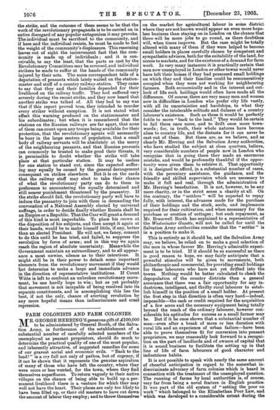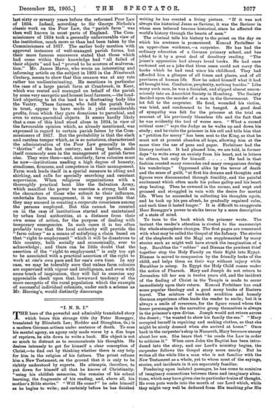less business than staying on in London on the chance
that there will be more jobs to go round, as there doubtless will, when times improve. But the case might be totally altered with many of them if they were helped to become small holders in places carefully chosen by competent and sympathetic advisers, both for the suitability of the land, for access to markets, and for the existence of a demand for farm work. In very many instances it is practically certain that men now unemployed in London or other towns would never have left their homes if they had possessed small holdings on which they and their families could be remuneratively occupied when they were not working for neighbouring farmers. Both economically and in the interest and out- look of life such holdings would often have made all the difference. Of course, there are very many men and women now in difficulties in London who prefer city life vastly, with all its uncertainties and hardships, to what they consider the intolerable solitude and dulness of a country labourer's existence. Such as these it would be perfectly futile to move " back to the land." They would be certain to fail there once more, and to drift once more town- wards ; for, in truth, their whole natures have become alien to country life, and the distaste for it can never be cast out of them. But there are, as we believe, and as clearly Mr. Herring and the Salvation Army authorities, who have studied the subject at close quarters, believe, very considerable numbers of people now in London who recognise that in going there they made an enormous mistake, and would be profoundly thankful if the oppor- tunity were given them to retrieve it. That opportunity it is 'designed to afford, in a substantial number of cases, with the pecuniary assistance, the guidance, and the friendly and skilled supervision which are necessary to make it full and real, through the administration of Mr. Herring's benefaction. It is not, however, to be any mere charity, or in the strict sense a charity at all. On the contrary, the "settlers " will be expected to repay fully, with interest, the advances made for the purchase of their holdings and the stock, seeds, and implements required for their cultivation, and when necessary for the purchase or erection of cottages ; but such repayment, as Mr. Bramwell Booth has explained to a representative of the Westminster Gazette, will not be called. for until the Salvation Army authorities consider that the " settler " is in a position to make it.
This is entirely as it should be, and the Salvation Army may, we believe, be relied on to make a good selection of the men in whose favour Mr. Herring's admirable experi- ment is to be tried. If it should be as successful as there is good reason to hope, we may fairly anticipate that a, powerful stimulus will be given to movements, both philanthropic and commercial, for providing small holdings for those labourers who have not yet drifted into the towns. Nothing would be better calculated to check the depopulation of the country districts than a general assurance that there was a fair opportunity for any in- dustrious, intelligent, and thrifty rural labourer to estab- lish himself in the position of a small holder. At present the first step in that direction is often very hard—indeed, impossible—the cash or credit required for the acquisition of a few acres and the necessary equipment being totally beyond the reach of the ordinary labourer, however con- siderable his aptitudes for success as a small farmer may be. But if it be once shown that a substantial number of men—even after a break of more or less duration with rural life and an experience of urban failure—have been able to prove themselves fit for conversion into peasant proprietors, we may reasonably look forward to a recogni- tion on the part of landlords and of owners of capital that it is sound business to facilitate the setting up in that line of life of farm labourers of good character and industrious habits.
It is not possible to speak with nearly the same amount of cheerful anticipation in regard to the somewhat in- discriminate advocacy of farm colonies which is heard in connection with the treatment of the unemployed question. The running of farms by local authorities is, of course, very far from being a novel feature in •English practice. It was part of the old system of " setting the poor on work " which belonged to the Elizabethan Poor Law, and which was developed to a considerable extent during the last sixty or seventy years before the reformed Poor Law of 1834. Indeed, according to Sir George Nichols's classic work on the Poor Law, the " parish farm " was then well known in most parts of England. The Com- missioners of 1834 took a generally unfavourable view of the institution, much more so than had been taken by the Commissioners of 1817. The earlier body mention with approval instances of well-managed parish farms, but their more famous successors stated that those which had come within their knowledge had " all failed of their objects " and had " proved to be sources of malversa- tion." Mr. James Mayor, who wrote an interesting and informing article on the subject in 1893 in the Nineteenth Century, seems to show that this censure was at any rate rather too undiscriminating. He mentions in particular the case of a large parish farm at Cranbrook, in Kent, which was rented and managed on behalf of the parish by some very energetic and honest local farmers,—the land- lord objecting to let the land to a fluctuating body like the Vestry. These farmers, who held the parish farm in trust, appear to have made it yield considerable profits, from which they gave donations to parochial, and even to extra-parochial objects. It seems hardly likely that a case of this kind stood alone in 1834, in view of the favourable opinion which, as already mentioned, was expressed in regard to certain parish farms by the Com- missioners of 1817. But the probability is that the slack and careless temper which, as is so notorious, characterised the administration of the Poor Law generally in the " thirties " of the last century, and long before, made itself commonly seen in the management of parish farms also. They were then—and, similarly, farm colonies must be now—institutions needing a high degree of honesty, steadiness, firmness, and competence in their management. Farm work lends itself in a special measure to idling and shirking, and calls for specially searching and constant supervision. When religious organisations with a thoroughly practical bent like the Salvation Army, which manifest the power to exercise a strong hold on the characters of those who submit to their influence, undertake farm management, it is very possible that they may succeed in creating a corporate conscience among the persons employed. But this cannot be counted on in the case of institutions started and maintained by urban local authorities, at a distance from their own scene of action, for the purpose of dealing with temporary emergencies. In such cases it is too often probably true that the local authority will provide the " farm colony " as a means of satisfying a claim based on that "right to employment" which it will be disastrous to this country, both socially and economically, ever to acknowledge ; and there can be little doubt that the assertion of the " right to employment " is only too apt to be associated with a practical assertion of the right to work at one's own pace and for one's own time. In any case, we may be tolerably sure that unless farm colonies are supervised with vigour and intelligence, and even with some touch of inspiration, they will fail to exercise any appreciable check upon that. townward tendency of the more energetic of the rural population which the example of successful individual colonists, under such a scheme as Mr. Herring's, would distinctly discouraga
"I. N. R. I."







































 Previous page
Previous page